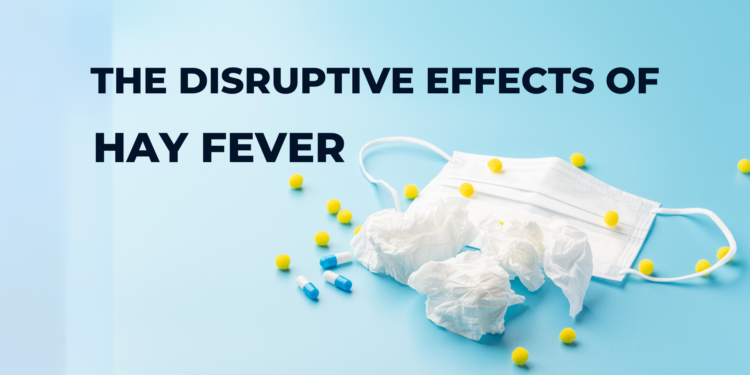With Easter just passed, and everyone having eaten copious amounts of chocolate whilst taking the kids out for Easter Hunts, it is important to remember that this time of year isn’t so pleasant for everyone.
Written by Professor Patrick Mitchell, Respiratory Consultant Physician at Tallaght University Hospital
As hay fever season began, the Asthma Society surveyed 1,274 people in Ireland about their asthma and/or hay fever. Of those surveyed with hay fever (727), 76% said that it limits their or their child’s daily activities and has a disruptive effect on their lives. Additionally, 42% of people surveyed reported missing at least one day of work or education due to hay fever in the past year, with one in five missing more than three days.
Almost half (47%) of those surveyed believe hay fever is not taken seriously by their friends or family. Furthermore, 44% of respondents don’t think healthcare providers take hay fever seriously, and 75% feel the same about policy-makers and politicians.
Professor Patrick Mitchell, a respiratory consultant physician at Tallaght University Hospital and member of the Asthma Society of Ireland’s Medical Advisory Group, commented on the findings, saying, “While most of us are enjoying the first signs of Spring, others are facing into months of the headaches, runny noses and sore throats associated with hay fever season.
“The results of our recent survey underscore the disruptive and often unrecognised effects of allergic rhinitis, or hay fever, on people’s quality of life, with three-quarters of the respondents reporting that their daily activities are limited by their symptoms.”
Professor Mitchell warned that, allergic rhinitis can pose particularly serious health risks for people with asthma. Over 450,000 people in Ireland have asthma, and allergic rhinitis can trigger asthma symptoms, like coughing and shortness of breath, and even an asthma attack. It can also be a risk factor in developing asthma. Often antihistamines and, if needed, steroidal nasal sprays will relieve symptoms.
Treatment for more persistent allergic rhinitis is also available, with sublingual immunotherapy (SLIT) proving particularly effective. Frustratingly for healthcare professionals and patients, though, Ireland has yet to approve SLIT for reimbursement, which presents a cost barrier to effective care. Missing school and work due to allergic rhinitis can reduce people’s immediate and future earning potential. These lost days also have implications for the wider economy. There is an onus on Irish policy-makers to catch up with the rest of Europe and make effective treatment more accessible.
Typical symptoms of seasonal hay fever and perennial allergic rhinitis include but are not limited to:
- Sneezing, as well as an itchy, blocked, or runny nose
- Red, itchy, or watery eyes
- An itchy throat, inner ear, or mouth
- A post-nasal drip
- A diminished sense of taste and smell
- Headaches, reduced concentration and general feeling unwell
A combination of medical and lifestyle advice can help people manage hay fever symptoms. Appropriate medications can be accessed through your pharmacist or GP.
Ruth Morrow, a Respiratory Nurse Specialist at the Asthma Society, said, “Typical symptoms of seasonal hay fever and perennial allergic rhinitis include sneezing, itchy or blocked nose, watery or itchy eyes, sore throat, post-nasal drip, and headaches. Pollen and dust levels are rising as the planet warms and hay fever season is getting longer. From the substantial numbers contacting me through our patient services and attending our webinars every year, it is clear that people are struggling with their symptoms.”
Ruth offers these practical tips for managing hay fever and allergic rhinitis symptoms and reducing the impact of pollen and dust on respiratory health.
- Keep doors and windows closed when the pollen count is high.
- Avoid exercising outside when the pollen count is high, and wear a cycle mask when cycling.
- Shower, wash your hair and change your clothes if you have been outdoors for an extended period.
- Wear wraparound sunglasses to prevent pollen from getting in your eyes, and splash your eyes with cold water to flush out pollen and soothe them.
- Avoid drying clothes outdoors because pollen spores may cling to them.
- Try to stay away from grassy areas and avoid mowing the lawn, as clouds of pollen can be created. Consider creating an allergy-friendly garden.
- Minimise contact with pets that have been outside, as pollen can linger on their fur.
- Keep your car windows closed when driving. Some cars can be fitted with a pollen filter.
- Apply a barrier gel/spray to the nostrils to prevent pollen from settling in the nose.
- If drying clothes outdoors, shake clothes to remove pollen spores before bringing them indoors and to put them in the airing cupboard before use.
- Discuss the use of treatments for hay fever with your pharmacist or GP.
- For those with asthma, make sure you have a personalised Asthma Action Plan. An Asthma Action Plan sets out the steps each patient needs to take to stay well with asthma and how to manage flare-ups when they happen. It should be filled out by a GP, nurse or consultant and reviewed regularly. These are available from your healthcare professional or can be downloaded from www.asthma.ie









